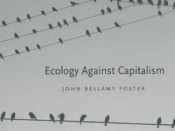“Marx’s Ecology in Historical Perspective,” [PDF] International Socialism, no. 97 (Autumn 2002), pp. 71-86.
‘For the early Marx the only nature relevant to the understanding of history is human nature … Marx wisely left nature (other than human nature) alone.’ These words are from George Lichtheim’s influential book Marxism: An Historical and Critical Study, first published in 1961. [1]
Though he was not a Marxist, Lichtheim’s view here did not differ from the general outlook of Western Marxism at the time he was writing. Yet this same outlook would be regarded by most socialists today as laughable. After decades of explorations of Marx’s contributions to ecological discussions and publication of his scientific-technical notebooks, it is no longer a question of whether Marx addressed nature, and did so throughout his life, but whether he can be said to have developed an understanding of the nature-society dialectic that constitutes a crucial starting point for understanding the ecological crisis of capitalist society.
Reprints:
- Reprint in Bertell Ollman and Kevin B. Anderson, ed., Karl Marx (Farnham, Surrey: Ashgate Publishing Group, 2012), 609-21.
- Part of the International Library of Essays in Classical Sociology series, edited by David Chalcraft.
Translations:
- Greek translation in Marxist Thought, December 2001
- Chinese translation by Guo Jianren in Marxist Philosophical Research (China), Wuhan University, 2002
- Malay translation by Muhammed Salleh in Suara Sosialisme (October 2002) http://arts.anu.edu.au/suara/foster1.rtf. Malay translation (2002) in Malayan edition of International Socialism.


